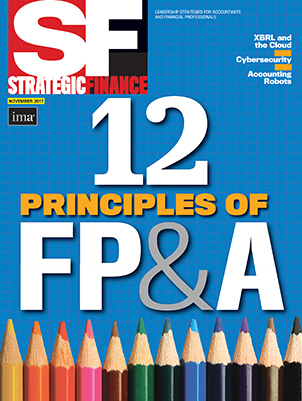“The robots are coming! The robots are coming!” No, those aren’t lines from a new science-fiction thriller. They’re the conclusion of a recent report by Deloitte, which suggests that 56% of Finance roles will likely become obsolete in the near future because of automation. (See “The robots are coming” at http://bit.ly/2zCMKs1.)
As we all know, automation isn’t coming—it’s already here and is likely to continue. And that’s a good thing because it will lead to operational efficiency (code for lower costs). Yet as artificial intelligence, automation, and advancements in technology (e.g., cognitive computing and machine learning) continue to impact tasks traditionally performed by accountants, many of us are wondering what’s ahead for the profession.
While automation is changing the way accountants work and the jobs they perform, it will also present opportunities for those who become “future-proof.” What do I mean by that? First, the relevance of the professional—and the profession—is at stake. Second, seizing opportunity from the jaws of risk (i.e., routine and repeatable accounting jobs or tasks being displaced or replaced) won’t occur by standing still. Our profession is known for its commitment to ethics but less for its agility, time to market, and capacity for change.
Many of the competencies necessary to become as future-proof as possible are those gained from the CMA® (Certified Management Accountant) certification program. To raise awareness about this, last month we introduced an integrated advertising and communications campaign that emphasizes the strategic value of CMAs in the face of increasing automation while embracing “augmented” intelligence, such as robotics, to create even greater value for organizations (view the commercial at http://bit.ly/2ip6Vpx).
As the campaign suggests, accountants who want to succeed in the future will need expertise in data analytics, data science, business intelligence, and the ability to manage technology and information systems. That’s in addition to the skills that have traditionally been assessed on the CMA exam, including financial planning, decision support, internal controls, and risk management.
Despite these anxiety-inducing changes in the profession, IMA members can rest assured that their association offers the resources they need to face the future with the confidence and competencies to seize opportunities. If you’re a CMA, develop additional expertise in areas such as data analytics, data science, data visualization, presentations, and storytelling. Also consider IMA’s new CSCA® (Certified in Strategy and Competitive Analysis) specialty credential. If you haven’t yet become a CMA, know this: The robots are coming, and it’s time to get prepared.

November 2017



